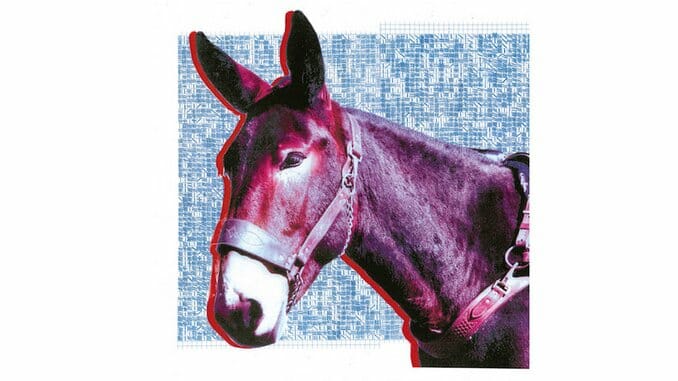Protomartyr Imagine Infinite Failures on Ultimate Success Today
The Detroit post-punk veterans offer their harshest statement yet on fifth LP
Music Reviews Protomartyr
“Dull ache turned sharp / Short breath, never caught,” Joe Casey repeats through the closing minute of “Day Without End,” his voice turning from detachment to anger, struggling above the hammering drums, guitars and horns as they remain largely unchanged except in their steadily building, brutally indifferent noise.
This begins Protomartyr’s fifth album, Ultimate Success Today, and in many respects encapsulates the mission of the Detroit post-punk veterans’ music. From their first LP No Passion All Technique to their latest release especially, Protomartyr have had a preoccupation with failure, the volcanic eruption of small, petty lives confronting the overwhelming forces, both external and internal, that bind them to their insignificance and vise versa.
Ultimate Success Today places that theme on an apocalyptic and disturbingly prescient scale. These tracks paint sketches of authoritarianism creeping dully into everyday life, soulless populism rooting its way into confused masses, animals trapped between choosing death or the pain that comes with surviving, and above all, the illusory promise of success in a world collapsing in on itself. It is, to put it lightly, not a happy world for Protomartyr.
But the concept behind the music can only be as moving as the music itself, and, thankfully, Protomartyr delivers. The band’s knack for meaty percussion and jagged guitars continues, with tracks “Processed by the Boys” and “Michigan Hammers” offering some of the punchiest rhythms of their discography. On top of that, the group expanded their usual sonic palette to include horns and strings. Jemeel Moondoc’s saxophone makes the most dramatic contribution, adding an untethered, disquieting presence to songs like “Day Without End” and “Tranquilizer,” along with some smooth accents to the band’s softer moments on “Worm in Heaven” and “The Aphorist.”
The additions seem to offer a double-edged sword, though. While it’s refreshing to hear Protomartyr branch out into new musical ideas, the rigid backdrop of guitars and drums served them well in the past, like a soundboard for Casey’s off-kilter delivery as it moved between complex shades of indignation, self-deprecation and buried conviction. While the instrumentals have taken a more dynamic turn on this album, the vocals sometimes come off as static. Casey still glides between the contempt of the powerful and the rage of the powerless, but the vulnerability that shined through on past albums with songs such as “Ellen” or “What the Wall Said” have taken a back seat to a more limited range of sneering derision for most of the record.
But perhaps this is simply what the present deserves. As the U.S. pushes itself further into self-inflicted catastrophe, unrest flairs across and between countries and intolerance spanning generations continues to upend any linear human progress, can we really ask our music to elevate our humanity when it could burn us in effigy instead?
On the penultimate track of the album, “Bridge and Crown,” Protomartyr offers their closest thing to an answer. “Everybody knows / We’re holding on / To little dreams / To drive our bodies on / Down the line / Till there’s nothing left / But the bridge and crown,” Casey sings, sounding like a lonely crooner at the end of time. The line could be read as corrosively cynical as the rest of the album. But with the rare frailty of Casey’s delivery in the moment, in the context of track after track having already lampooned hope after hope, it could also be heard as something more.
“Ultimate Success” may be nothing more than a cruel dream in Protomartyr’s world, but to recognize the fullness of existing in its petty failures, empty promises and inevitable conclusion, and to strive anyway is the tiny chance of redemption hidden within the crushing weight of the band’s portrait.
The stronger case for this might be the character on the closing track, “Worm in Heaven,” who emerges from the song’s smooth bass lines and neatly arranged horns to proclaim an air of cool detachment ( “Grass has grown over me / Long before now”), cracks into confession shortly after (“I was frightened / Always frightened) and as a waves of distortion crash down near the track’s conclusion, crumbles into the realization of a life unlived (“I exist, I did / I was here, I was or / Never never never never never was”).
Jack Meyer is an editorial intern at Paste and student in New York. He enjoys literature, philosophy, music, and low earnings potential out of college.